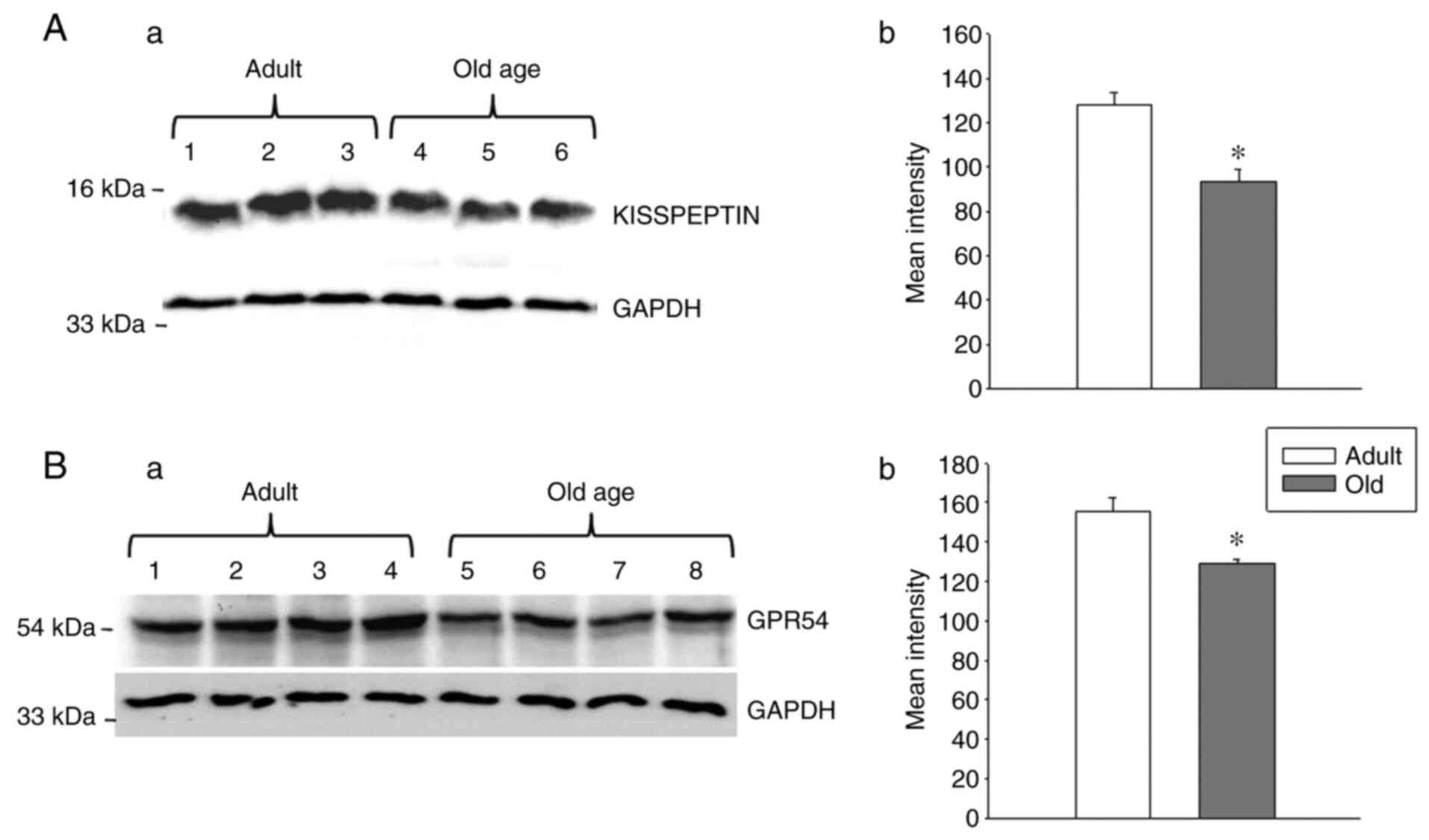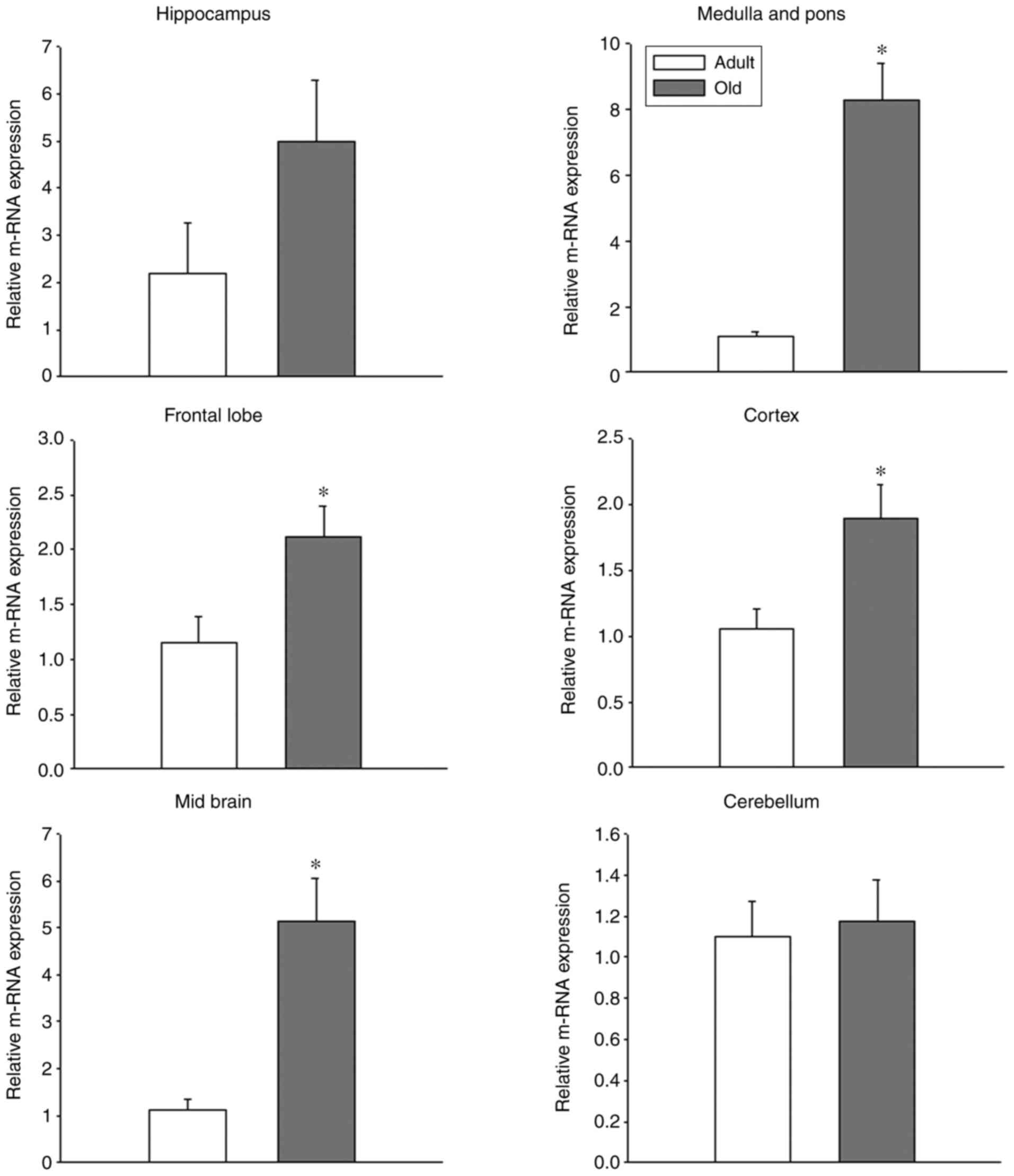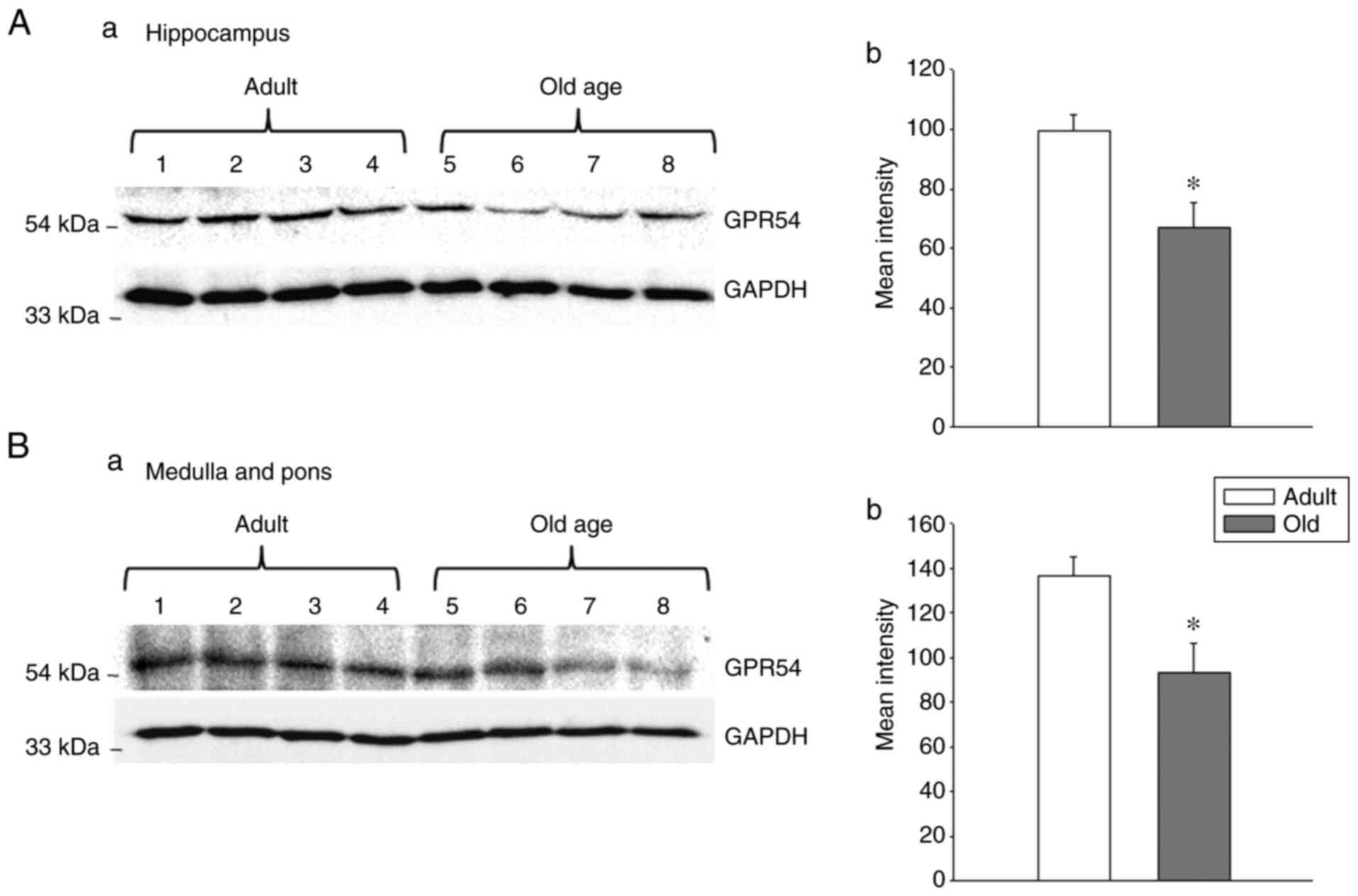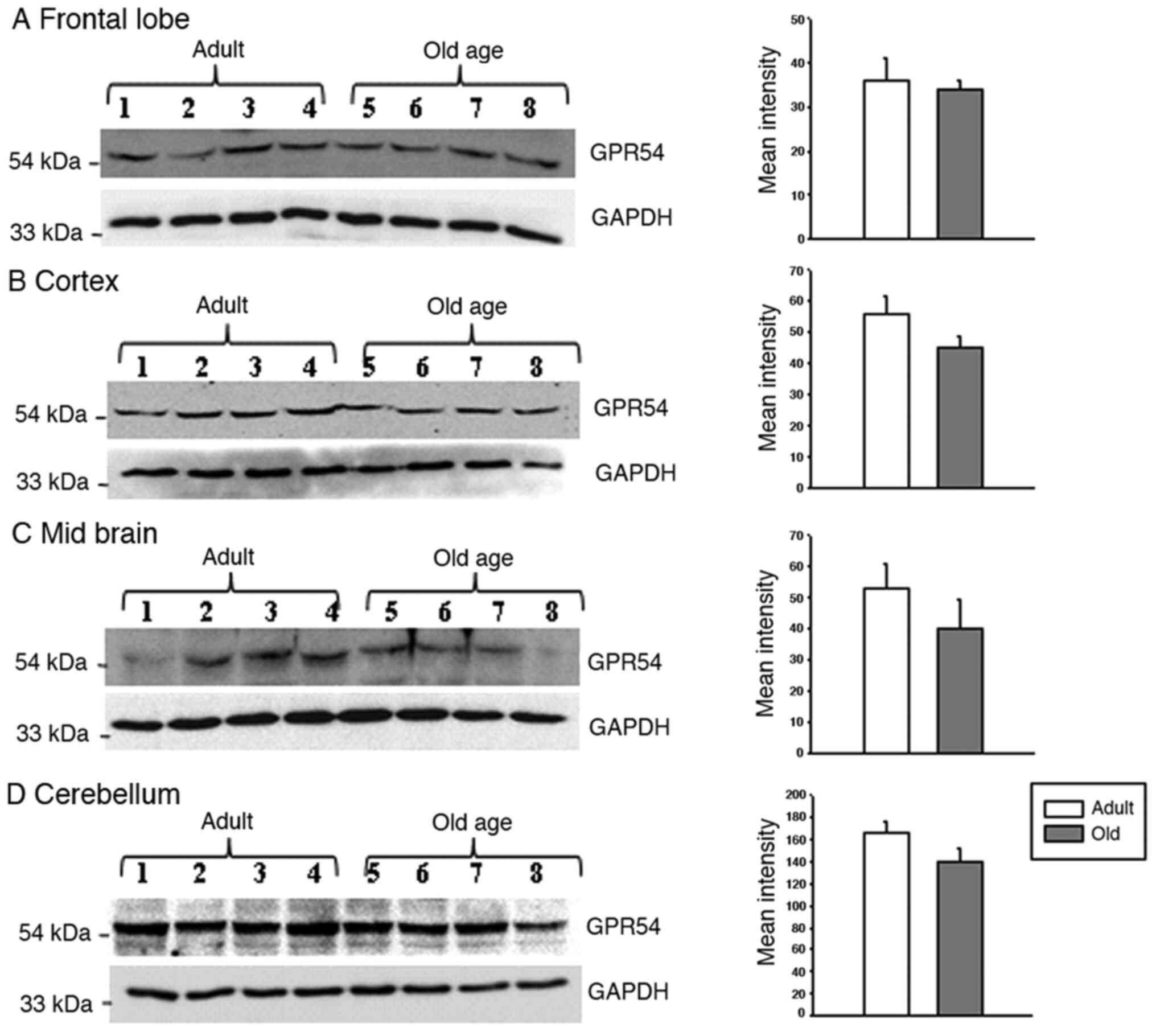|
1
|
Veldhuis JD: Aging and hormones of the
hypothalamo- pituitary axis: Gonadotropic axis in men and
somatotropic axes in men and women. Ageing Res Rev. 7:189–208.
2008.PubMed/NCBI View Article : Google Scholar
|
|
2
|
Steiner RA, Bremner WJ, Clifton DK and
Dorsa DM: Reduced pulsatile luteinizing hormone and testosterone
secretion with aging in the male rat. Biol Reprod. 31:251–258.
1984.PubMed/NCBI View Article : Google Scholar
|
|
3
|
Scarbrough K and Wise PM: Age-related
changes in pulsatile luteinizing hormone release precede the
transition to estrousacyclicity and depend upon estrous cycle
history. Endocrinology. 126:884–890. 1990.PubMed/NCBI View Article : Google Scholar
|
|
4
|
Wise PM, Dueker E and Wuttke W:
Age-related alterations in pulsatile luteinizing hormone release:
Effects of long-term ovariectomy, repeated pregnancies and
naloxone. Biol Reprod. 39:1060–1066. 1988.PubMed/NCBI View Article : Google Scholar
|
|
5
|
Kunimura Y, Iwata K, Ishigami A and Ozawa
H: Age- related alterations in hypothalamic kisspeptin, neurokinin
B, and dynorphin neurons and in pulsatile LH release in female and
male rats. Neurobiol Aging. 50:30–38. 2017.PubMed/NCBI View Article : Google Scholar
|
|
6
|
Pinilla L, Aguilar E, Dieguez C, Millar RP
and Tena-Sempere M: Kisspeptins and reproduction: Physiological
roles and regulatory mechanisms. Physiol Rev. 92:1235–1316.
2012.PubMed/NCBI View Article : Google Scholar
|
|
7
|
Mead EJ, Maguire JJ, Kuc RE and Davenport
AP: Kisspeptins: A multifunctional peptide system with a role in
reproduction, cancer and the cardiovascular system. Br J Pharmacol.
151:1143–1153. 2007.PubMed/NCBI View Article : Google Scholar
|
|
8
|
Kotani M, Detheux M, Vandenbogaerde A,
Communi D, Vanderwinden JM, Le Poul E, Brézillon S, Tyldesley R,
Suarez-Huerta N, Vandeput F, et al: The metastasis suppressor gene
KiSS-1 encodes kisspeptins, the natural ligands of the orphan G
protein-coupled receptor GPR54. J Biol Chem. 276:34631–34636.
2001.PubMed/NCBI View Article : Google Scholar
|
|
9
|
Lee DK, Nguyen T, O'Neill GP, Cheng R, Liu
Y, Howard AD, Coulombe N, Tan CP, Tang-Nguyen AT, George SR and
O'Dowd BF: Discovery of a receptor related to the galanin
receptors. FEBS Lett. 446:103–107. 1999.PubMed/NCBI View Article : Google Scholar
|
|
10
|
Oakley AE, Clifton DK and Steiner RA:
Kisspeptin signaling in the brain. Endocr Rev. 30:713–743.
2009.PubMed/NCBI View Article : Google Scholar
|
|
11
|
Shahab M, Mastronardi C, Seminara SB,
Crowley WF, Ojeda SR and Plant TM: Increased hypothalamic GPR54
signaling: A potential mechanism for initiation of puberty in
primates. Proc Natl Acad Sci. 102:2129–2134. 2005.PubMed/NCBI View Article : Google Scholar
|
|
12
|
Seminara SB, Messager S, Chatzidaki EE,
Thresher RR, Acierno JS Jr, Shagoury JK, Bo-Abbas Y, Kuohung W,
Schwinof KM, Hendrick AG, et al: The GPR54 gene as a regulator of
puberty. N Engl J Med. 349:1614–1627. 2003.PubMed/NCBI View Article : Google Scholar
|
|
13
|
Castano JP, Martínez-Fuentes AJ,
Gutiérrez-Pascual E, Vaudry H, Tena-Sempere M and Malagón MM:
Intracellular signaling pathways activated by kisspeptins through
GPR54: Do multiple signals underlie function diversity? Peptides.
30:10–15. 2009.PubMed/NCBI View Article : Google Scholar
|
|
14
|
Ohtaki T, Shintani Y, Honda S, Matsumoto
H, Hori A, Kanehashi K, Terao Y, Kumano S, Takatsu Y, Masuda Y, et
al: Metastasis suppressor gene KiSS-1 encodes peptide ligand of a
G-protein-coupled receptor. Nature. 411:613–617. 2001.PubMed/NCBI View
Article : Google Scholar
|
|
15
|
Muir AI, Chamberlain L, Elshourbagy NA,
Michalovich D, Moore DJ, Calamari A, Szekeres PG, Sarau HM,
Chambers JK, Murdock P, et al: AXOR12, a novel human G protein-
coupled receptor, activated by the peptide KiSS-1. J Biol Chem.
276:28969–28975. 2001.PubMed/NCBI View Article : Google Scholar
|
|
16
|
Teles MG, Bianco SD, Brito VN, Trarbach
EB, Kuohung W, Xu S, Seminara SB, Mendonca BB, Kaiser UB and
Latronico AC: A GPR54-activating mutation in a patient with central
precocious puberty. N Engl J Med. 358:709–715. 2008.PubMed/NCBI View Article : Google Scholar
|
|
17
|
De Roux N, Genin E, Carel JC, Matsuda F,
Chaussain JL and Milgrom E: Hypogonadotropic hypogonadism due to
loss of function of the KiSS1-derivedpe ptidereceptor GPR54.
Proc Natl Acad Sci. 100:10972–10976. 2003.PubMed/NCBI View Article : Google Scholar
|
|
18
|
Zhang G, Li J, Purkayastha S, Tang Y,
Zhang H, Yin Y, Li B, Liu G and Cai D: Hypothalamic programming of
systemic ageing involving IKK-β, NF-κB and GnRH. Nature.
497:211–216. 2013.PubMed/NCBI View Article : Google Scholar
|
|
19
|
Richard N, Galmiche G, Corvaisier S,
Caraty A and Kottler ML: KiSS-1 and GPR54 genes are co-expressed in
rat gonadotrophs and differentially regulated in vivo by oestradiol
and gonadotrophin-releasing hormone. J Neuroendocrinol. 20:381–393.
2008.PubMed/NCBI View Article : Google Scholar
|
|
20
|
Spijker S: Dissection of rodent brain
regions. Mol Cell Neurosci. 57:23–26. 2011.
|
|
21
|
Heffner TG, Hartman JA and Seiden LS: A
Rapid method for the regional dissection of the rat brain.
Pharmacol Biochem Behav. 13:453–456. 1980.PubMed/NCBI View Article : Google Scholar
|
|
22
|
Livak KJ and Schmittgen TD: Analysis of
relative gene expression data using real-time quantitative PCR and
the 2(-Delta Delta C(T)) method. Methods. 25:402–408.
2001.PubMed/NCBI View Article : Google Scholar
|
|
23
|
Bradford MM: A rapid and sensitive method
for the quantitation of microgram quantities of protein utilizing
the principle of protein-dye binding. Anal Biochem. 72:248–254.
1976.PubMed/NCBI View Article : Google Scholar
|
|
24
|
Laemmli UK: Cleavage of structural
proteins during the assembly of the head of bacteriophage T4.
Nature. 227:680–685. 1970.PubMed/NCBI View
Article : Google Scholar
|
|
25
|
Arai AC, Xia YF, Suzuki E, Kessler M,
Civelli O and Nothacker HP: Cancer metastasis-suppressing peptide
metastin upregulates excitatory synaptic transmission in
hippocampal dentate granule cells. J Neurophysiol. 94:3648–3652.
2005.PubMed/NCBI View Article : Google Scholar
|
|
26
|
Welch DR, Chen P, Miele ME, McGary CT,
Bower JM, Stanbridge EJ and Weissman BE: Microcell-mediated
transfer of chromosome 6 into metastatic human C8161 melanoma cells
suppresses metastasis but does not inhibit tumorigenicity.
Oncogene. 9:255–262. 1994.PubMed/NCBI
|
|
27
|
Mattam U, Talari NK, Paripati AK,
Krishnamoorthy T and Sepuri NBV: Kisspeptin preserves mitochondrial
function by inducing mitophagy and autophagy in aging rat brain
hippocampus and human neuronal cell line. Biochim Biophys Acta Mol
Cell Res. 1868(118852)2021.PubMed/NCBI View Article : Google Scholar
|
|
28
|
Gottsch ML, Cunningham MJ, Smith JT, Popa
SM, Acohido BV, Crowley WF, Seminara S, Clifton DK and Steiner RA:
A role for kisspeptins in the regulation of gonadotropin secretion
in the mouse. Endocrinology. 145:4073–4077. 2004.PubMed/NCBI View Article : Google Scholar
|
|
29
|
Kinoshita M, Tsukamura H, Adachi S, Matsui
H, Uenoyama Y, Iwata K, Yamada S, Inoue K, Ohtaki T, Matsumoto H
and Maeda K: Involvement of central metastin in the regulation of
preovulatory luteinizing hormone surge and estrous cyclicity in
female rats. Endocrinology. 146:4431–4436. 2005.PubMed/NCBI View Article : Google Scholar
|
|
30
|
Clarkson J and Herbison AE: Postnatal
development of kisspeptin neurons in mouse hypothalamus; sexual
dimorphism and projections to gonadotropin-releasing hormone
neurons. Endocrinology. 147:5817–5825. 2006.PubMed/NCBI View Article : Google Scholar
|
|
31
|
Mikkelsen JD and Simonneaux V: The
neuroanatomy of the kisspeptin system in the mammalian brain.
Peptides. 30:26–33. 2009.PubMed/NCBI View Article : Google Scholar
|
|
32
|
Navarro VM, Castellano JM,
Fernández-Fernández R, Barreiro ML, Roa J, Sanchez-Criado JE,
Aguilar E, Dieguez C, Pinilla L and Tena-Sempere M: Developmental
and hormonally regulated messenger ribonucleic acid expression of
KiSS-1 and its putative receptor, GPR54, in rat hypothalamus and
potent luteinizing hormone-releasing activity of KiSS-1 peptide.
Endocrinology. 145:4565–4574. 2004.PubMed/NCBI View Article : Google Scholar
|
|
33
|
Matsui H, Takatsu Y, Kumano S, Matsumoto H
and Ohtaki T: Peripheral administration of metastin induces marked
gonadotropin release and ovulation in the rat. Biochem Biophys Res
Commun. 320:383–388. 2004.PubMed/NCBI View Article : Google Scholar
|
|
34
|
Thompson EL, Patterson M, Murphy KG, Smith
KL, Dhillo WS, Todd JF, Ghatei MA and Bloom SR: Central and
peripheral administration of kisspeptin-10 stimulates the
hypothalamic- pituitary-gonadal axis. J Neuroendocrinol.
16:850–858. 2004.PubMed/NCBI View Article : Google Scholar
|
|
35
|
Dhillo WS, Chaudhri OB, Patterson M,
Thompson EL, Murphy KG, Badman MK, McGowan BM, Amber V, Patel S,
Ghatei MA and Bloom SR: Kisspeptin-54 stimulates the
hypothalamic-pituitary gonadal axis in human males. J Clin
Endocrinol Metab. 90:6609–6615. 2005.PubMed/NCBI View Article : Google Scholar
|
|
36
|
Sano A and Kimura F: Electrical activity
of the pulse generator of gonadotropin-releasing hormone in
26-month-old female rats. Neuroendocrinology. 72:199–207.
2000.PubMed/NCBI View Article : Google Scholar
|
|
37
|
Bonavera JJ, Swerdloff RS, Leung A, Lue
YH, Baravarian S, Superlano L, Sinha-Hikim AP and Wang C: In the
male brown-Norway (BN) male rat, reproductive aging is associated
with decreased LH-pulse amplitude and area. J Androl. 18:359–365.
1997.PubMed/NCBI
|
|
38
|
Novaira HJ, Sonko ML and Radovick S:
Kisspeptin induces dynamic chromatin modifications to control GnRH
gene expression. Mol Neurobiol. 53:3315–3325. 2016.PubMed/NCBI View Article : Google Scholar
|
|
39
|
Irwig MS, Fraley GS, Smith JT, Acohido BV,
Popa SM, Cunningham MJ, Gottsch ML, Clifton DK and Steiner RA:
Kisspeptin activation of gonadotropin releasing hormone neurons and
regulation of KiSS-1mRNA in the male rat. Neuroendocrinology.
80:264–272. 2004.PubMed/NCBI View Article : Google Scholar
|
|
40
|
Han SK, Gottsch ML, Lee KJ, Popa SM, Smith
JT, Jakawich SK, Clifton DK, Steiner RA and Herbison AE: Activation
of gonadotropin-releasing hormone neurons by kisspeptin as a
neuroendocrine switch for the onset of puberty. J Neurosci.
25:11349–11356. 2005.PubMed/NCBI View Article : Google Scholar
|
|
41
|
Herbison AE, de Tassigny XD, Doran J and
Colledge WH: Distribution and postnatal development of Gpr54gene
expression in mouse brain and gonadotropin-releasing hormone
neurons. Endocrinology. 151:312–321. 2010.PubMed/NCBI View Article : Google Scholar
|
|
42
|
Gonskikh Y and Polacek N: Alterations of
the translation apparatus during aging and stress response. Mech
Ageing Dev. 168:30–36. 2017.PubMed/NCBI View Article : Google Scholar
|
|
43
|
Anisimova AS, Alexandrov AI, Makarova NE,
Gladyshev VN and Dmitriev SE: Protein synthesis and quality control
in aging. Aging (Albany NY). 10:4269–4288. 2018.PubMed/NCBI View Article : Google Scholar
|
|
44
|
Arai AC and Orwig N: Factors that regulate
KiSS1 gene expression in the hippocampus. Brain Res.
1243:10–18. 2008.PubMed/NCBI View Article : Google Scholar
|



















